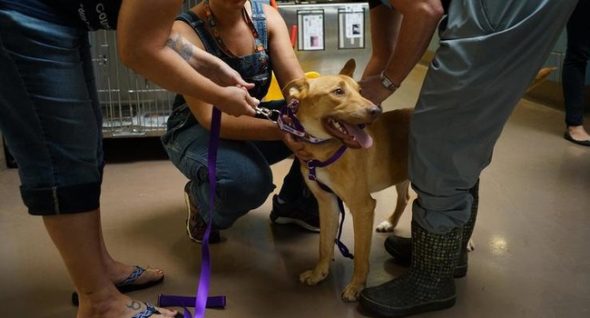
————————————————————————————————————————————————————————————————————————————————————————————————————————————
In Chicago, While neglectful or cruel owners go through the court system, their dogs — the hapless victims — often spend their time in lockdown.
Just this week, there were 16 dogs confiscated from a home full of drugs and guns. Two others were discovered living in inhumane conditions.
These are “court case dogs,” animals who — due to their owners alleged criminal activity — have their lives put on hold as the cases unfold. Owners who refuse to relinquish ownership force this situation as the animals, considered evidence, spend their time in kennels — sometimes for more than a year. Dogs in this situation cannot be placed up for adoption. And often, when the court cases are finished, they end up getting euthanized.
But in 2010 a nonprofit called Safe Humane — a group that formed to train volunteers to show up in courtrooms during owners’ hearings to advocate on behalf of the animals — petitioned the city to allow them to build training facilities for Court Case Dogs near the animal control shelter. The dogs were trained as comfort animals for veterans suffering from PTSD and at-risk youths. Others were placed with rescue groups to be adopted.
The Chicago Tribune reports that this month, Safe Humane is celebrating it’s 1,000th saved Court Case Dog.
“It makes me feel like I’m making a difference,” Georgia Libbares, who collects police tips, reports from animal advocacy groups and news stories each day to prepare a list of upcoming Court Case Dogs, told the Chicago Tribune.
————————————————————————————————————————————————————————————————————————————————————————————————————————————
Discover how the Court Case Dog Program got started and brought Safe Humane Chicago full circle in this video:
————————————————————————————————————————————————————————————————————————————————————————————————————————————
Often, suspects charged with animal abuse are usually arrested for additional crimes — gang activity, gun possession, drug dealing — the dog mistreatment often becomes an afterthought for prosecutors, Cynthia Bathurst, executive director and co-founder of Safe Humane, told the Tribune.
Seven years after its formation, nearly 175 volunteers operate the program. Advocates show up in court to help assistant state’s attorneys with the various legal avenues that can allow evidence dogs to be treated as regular shelter dogs — receiving regular walks, enroll in training programs and be available for adoption.
“A lot of people care about this, but it’s probably low on their to-do list,” Libbares said. “Our presence in court does make a difference.”
Once the dogs are brought to Chicago Animal Care and Control, Safe Humane volunteers assess the animals to determine if they are safe enough for the program. Roughly 70 percent have the traits of bully breeds, blocky heads and such, but Safe Humane’s M.O. is that all dogs must be evaluated, not judged by looks or breed. About 15 percent are deemed ineligible for the program, whether because of health or behavioral issues.
“Chicago Animal Care and Control is very fortunate to have Safe Humane Chicago as a unique partner on several programs that help CACC expand its capacity for care and enrich dogs’ lives within the city shelter,” Susan Russell, executive director of Chicago Animal Care and Control, told the Chicago Tribune.
